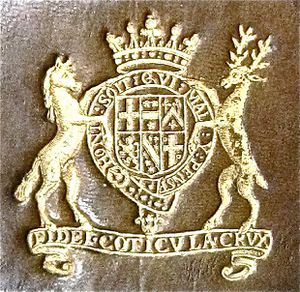Difference between revisions of "George Villiers 1592-1628"
m (Text replacement - "personal Title" to "personal title") |
m (SamBrown moved page George Villiers to George Villiers 1592-1628 without leaving a redirect) |
||
| (6 intermediate revisions by 2 users not shown) | |||
| Line 1: | Line 1: | ||
__NOTITLE__ | __NOTITLE__ | ||
| − | ===[[name::George]] [[name::VILLIERS]], 1st [[personal title::Duke of Buckingham]] [[date of | + | ===[[name::George]] [[name::VILLIERS]], 1st [[personal title::Duke of Buckingham]] [[date of birth::1592]]-[[date of death::1628]]=== |
| − | + | [[file:GeorgeVilliers.jpg|thumb|One of Villiers's armorial stamps (British Armorial Bindings)]] | |
====Biographical Note==== | ====Biographical Note==== | ||
| − | + | Born at [[place of birth::Brooksby Hall, Leicestershire]], second son of Sir [[family::George Villiers]]. He was educated locally and by travelling in [[location::Europe]]; his career took off when his looks and charm enabled him to replace Robert Carr as the favourite of James I, around 1614, after which he was showered with gifts and titles. By 1618 he was Marquess of Buckingham, and had acquired extensive estates (the Dukedom followed in 1623). He was much involved in political life, and the target of growing criticism for corruption; by travelling to [[location::Spain]] with Prince Charles in 1623, to negotiate the abortive marriage proposal with Philip IV's daughter, he cemented a good relationship with Charles, who kept him in office when he succeeded to the throne in 1625. Sent on various unsuccessful naval missions thereafter, he became a target of opposition, but when the [[organisations::House of Commons]] voted for his impeachment in 1626, Charles dissolved parliament to halt the process. Villiers was assassinated in [[location::Portsmouth]] in 1628 shortly before setting out on another expedition. | |
====Books==== | ====Books==== | ||
| − | + | A number of books using Villiers's armorial stamps are recorded in the Armorials Database; the extent and disposition of his library are not known (the administration of his estate after his death was complicated by extensive debts). In 1625, in his capacity as [[occupation::Chancellor]] of [[organisations::University of Cambridge|Cambridge University]], he purchased the [[subject::orientalism|oriental]] [[format::manuscripts]] of the Dutch scholar [[associates::Thomas Erpenius]] (d.1624), for the [[organisations::Cambridge University Library|University Library]]; plans for Villiers to help to fund a new library building there were frustrated by his death. | |
====Sources==== | ====Sources==== | ||
| Line 20: | Line 20: | ||
[[Category:Dukes]] | [[Category:Dukes]] | ||
[[Category:Armorial Stamps]] | [[Category:Armorial Stamps]] | ||
| − | [[Category: | + | [[Category:All Owners]] |
Latest revision as of 06:39, 17 August 2022
George VILLIERS, 1st Duke of Buckingham 1592-1628
Biographical Note
Born at Brooksby Hall, Leicestershire, second son of Sir George Villiers. He was educated locally and by travelling in Europe; his career took off when his looks and charm enabled him to replace Robert Carr as the favourite of James I, around 1614, after which he was showered with gifts and titles. By 1618 he was Marquess of Buckingham, and had acquired extensive estates (the Dukedom followed in 1623). He was much involved in political life, and the target of growing criticism for corruption; by travelling to Spain with Prince Charles in 1623, to negotiate the abortive marriage proposal with Philip IV's daughter, he cemented a good relationship with Charles, who kept him in office when he succeeded to the throne in 1625. Sent on various unsuccessful naval missions thereafter, he became a target of opposition, but when the House of Commons voted for his impeachment in 1626, Charles dissolved parliament to halt the process. Villiers was assassinated in Portsmouth in 1628 shortly before setting out on another expedition.
Books
A number of books using Villiers's armorial stamps are recorded in the Armorials Database; the extent and disposition of his library are not known (the administration of his estate after his death was complicated by extensive debts). In 1625, in his capacity as Chancellor of Cambridge University, he purchased the oriental manuscripts of the Dutch scholar Thomas Erpenius (d.1624), for the University Library; plans for Villiers to help to fund a new library building there were frustrated by his death.
Sources
- British Armorial Bindings.
- Lockyer, Roger. "Villiers, George, first duke of Buckingham (1592–1628), royal favourite." Oxford Dictionary of National Biography.
- Oates, J. C. T. Cambridge University Library: a history. Cambridge, 1986, 164-7.
